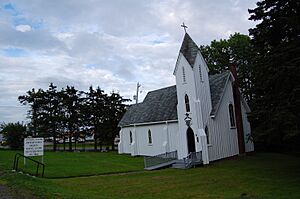Simon Gibbons (priest) facts for kids
Quick facts for kids The ReverendSimon Gibbons |
|
|---|---|
| Missionary | |
| Born | 21 June 1851 Forteau, Newfoundland and Labrador |
| Died | 14 December 1896 (aged 45) Parrsboro, Nova Scotia |
| Spouse(s) | Frances Eliza DuVernet |
| Venerated in | Anglican Church of Canada |
| Feast | 14 December |
Simon Gibbons (born June 21, 1851 – died December 14, 1896) was a very important person in Canadian history. He was Canada's first Inuit priest. As an Anglican missionary, he helped build many churches in Nova Scotia. He was known for his dedication and for traveling long distances to help people.
Contents
Simon Gibbons' Early Life
Simon Gibbons was likely born in Forteau, Newfoundland and Labrador, on June 21, 1851. His father was a fisherman named Thomas Gibbons. His mother, an Inuit woman, sadly passed away when he was born.
Some stories say that Simon was found as a child on an ice-floe off the coast of Labrador. However, the first official record shows him at age six. In 1857, after his father died, Simon and his three brothers and a sister-in-law went to an orphanage in St. John's. This was called the Church of England Widows and Orphans Asylum.
Three years later, Simon went to a school run by Reverend George Poulett Harris. He was a very good student. He also learned from Reverend Mr. Hutchinson at Tilt Cove. In 1862, Simon left the orphanage. He was taken in by Sophia Mountain, who was in charge of the asylum. She later married Edward Feild, who was a Bishop in Newfoundland.
In 1875, Simon moved to Quebec. There, he worked as a lay reader, teacher, and catechist. He also tutored the son of a local church leader. In Quebec, he met Frances Eliza DuVernet, the leader's daughter. They would later get married.
Becoming a Priest
From 1876 to 1877, Simon Gibbons studied at King's College in Windsor, Nova Scotia. He was preparing to become a priest. Bishop Hibbert Binney made him a deacon on February 25, 1877. Then, on March 25, 1878, he became a priest.
Simon became a traveling missionary in Victoria County on Cape Breton Island. He served many fishermen and their families. He often traveled using snowshoes when the weather was too bad for horses or sleighs. Simon was known for being smart and having a good sense of humor. He was also very strong and could handle tough journeys.
Traveling to Raise Money
In 1881 and 1882, Simon Gibbons traveled all the way to England. He went there to ask for money to build churches in his area. He even preached in Westminster Abbey and met Queen Victoria! He once said, "my face was my fortune." This meant his unique look, which was described as his "Eskimo physique," helped him get attention and support.
When he returned in 1883, Simon built two churches and a mission house. He also gave his bishop $4500 to help support the mission. One of the churches he built was Saint Peter's and Saint John's Anglican Church in Baddeck, Nova Scotia.
In 1885, Simon went to the West Indies to get better after being sick. Then, he moved to Lockeport, Nova Scotia. There, he served three church groups along 35 miles of coastline. In 1888, after another trip to Britain for funding, Simon moved again. This time, he went to Parrsboro, where he helped build three more churches.
Church Designs by Simon Gibbons
Simon Gibbons might have visited Cambridge during his trips to England. The churches he built in Canada looked like the style of the Cambridge Camden Society. His churches were simple, like old European churches, but he used wood instead of stone. A special part of his churches was their bell towers. They had a unique shape called a Rhenish helm, or Rhineland helmet.
Simon Gibbons' Legacy
Simon Gibbons passed away on December 14, 1896, in Parrsboro. He was buried there. The Canadian Calendar of Holy Persons of the Anglican Church of Canada remembers Simon Gibbons every year on December 14.
An inukshuk was recently built to honor him. This special stone monument is on the Diligent River, where he worked in his last years.
 | Bessie Coleman |
 | Spann Watson |
 | Jill E. Brown |
 | Sherman W. White |


